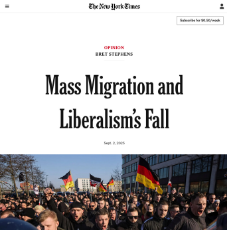Have we been living in a postliberal democracy? A callous system where the political elites hear the pleas of the public but ignore them for the sake of "upholding liberal values"? For the past decade, I there has been an ever increasing push by politicians to import shitskins by the tens of millions in spite of opposition by the public.
I saw this NYT oped which includes this passage:
https://archive.is/458VR (whole article here)
>Starting around 20 years ago, perhaps earlier, liberal democracy gained two half-siblings: postliberal democracy and preliberal democracy.
>Preliberal democracy accepts the practice of regular elections but rejects most of the core values of liberalism: free speech and moral tolerance, civil liberties and the rights of the accused, the rule of law and independence of courts, the equality of women and so on. Turkey under the long reign of Recep Tayyip Erdogan typifies this type of democracy, as did Egypt under the short reign of the Muslim Brotherhood’s Mohamed Morsi.
>Postliberal democracy, by contrast, embraces the values of liberalism but tries to insulate itself from the will of the people. The European Union, with its vast architecture of transnational legislation, is one example of postliberalism; international courts, issuing rulings where they have no jurisdiction, are another; global environmental accords, like the Kyoto Protocol and the Paris Agreement (signed by the Obama administration but never ratified by Congress), are a third.`
Interesting theory here. Postliberal democracy describes the mindset of "We know the people want less migrants, but we're going to import millions of shitskins anyway".
/mlpol/ - My Little Politics
1 replies | 2 files | 2 UUIDs | Page 1
The issue is kinda fundamental.
Here's the deal: all governments are ideological. Even the so-called "liberal" or "non-ideological" ones. Because saying "we don't follow ideology" is itself… an ideology. (Sort of like Orwell's line: when an artist says 'my art is separate from politics', that statement itself is political.)
And here's the catch: every ideological system (aka every government ever) runs into the same disease, being chained to its past.
Look: when you start a government on a "non-ideology" like liberalism, you'll inevitably run into contradictions. No ideology (even the ideology of "no ideology") is perfect. But the second those flaws show up, they clash with the government's founding dogma. And governments don't like breaking their dogma, because that means losing legitimacy. So instead they defend it, even if it's wrong.
The deeper the problem, the worse it gets:
1-They see the problem too late, because their ideology blinds them from even admitting it exists.
2-Even when they do see it, they can't fix it, because fixing it would mean breaking their own sacred foundations, which could collapse the whole system.
So what happens? Early on, a government could solve these issues quietly, sometimes sticking to its principles, sometimes bending them a little. But they rarely do, because the problem isn't obvious yet. By the time it is obvious, it's already welded into their ideology. They start fighting critics instead of fixing the flaw, defending the very thing that's eating them alive. By the time they wake up and say 'oh shit, this is actually a problem', it's too late.
They can't even call it a problem anymore. Their own stubbornness has made it part of their identity. So they double down.
Here's a metaphor:
Think of the people as an inductor in a circuit. The more current (ideological stubbornness, propaganda, repression) the government pushes, the more energy the people store as resentment. If the current stays smooth, you get some fake stability. But real life isn't smooth. Shit happens, say, a white child gets raped or murdered by some nigger. BOOM! The current jolts. To stop that backlash from exploding, the government cranks up the current even harder: prosecuting the parents, defending the rapist in court, importing even more shit-skins and more...
But that only ramps up the stored energy.
And eventually, two endings are possible:
Path A: The government finally breaks and admits it was wrong. The coil unloads everything at once>>>public revolt, maybe regime change.
Path B: The government never breaks, keeps pumping harder>>>the whole circuit (the country itself) fries and collapses completely.
Most overthrown regimes took Path A. Path B takes insane, suicidal stubbornness, but sadly, some governments actually go that way.
That's why leaders know damn well that flooding the country with migrants is a mistake, but they literally can't stop. They have defended it too long. If they backpedal, they lose everything. So instead they sacrifice the future to protect the past.
They put the future in the coffin of the past.
Neo-liberal "patches" are nothing but painkillers. They don't cure shit. They just delay collapse. A broken system has only so much capacity. Eventually the current gets too strong, and then either the ideology burns, or the entire nation burns with it.
Here's the deal: all governments are ideological. Even the so-called "liberal" or "non-ideological" ones. Because saying "we don't follow ideology" is itself… an ideology. (Sort of like Orwell's line: when an artist says 'my art is separate from politics', that statement itself is political.)
And here's the catch: every ideological system (aka every government ever) runs into the same disease, being chained to its past.
Look: when you start a government on a "non-ideology" like liberalism, you'll inevitably run into contradictions. No ideology (even the ideology of "no ideology") is perfect. But the second those flaws show up, they clash with the government's founding dogma. And governments don't like breaking their dogma, because that means losing legitimacy. So instead they defend it, even if it's wrong.
The deeper the problem, the worse it gets:
1-They see the problem too late, because their ideology blinds them from even admitting it exists.
2-Even when they do see it, they can't fix it, because fixing it would mean breaking their own sacred foundations, which could collapse the whole system.
So what happens? Early on, a government could solve these issues quietly, sometimes sticking to its principles, sometimes bending them a little. But they rarely do, because the problem isn't obvious yet. By the time it is obvious, it's already welded into their ideology. They start fighting critics instead of fixing the flaw, defending the very thing that's eating them alive. By the time they wake up and say 'oh shit, this is actually a problem', it's too late.
They can't even call it a problem anymore. Their own stubbornness has made it part of their identity. So they double down.
Here's a metaphor:
Think of the people as an inductor in a circuit. The more current (ideological stubbornness, propaganda, repression) the government pushes, the more energy the people store as resentment. If the current stays smooth, you get some fake stability. But real life isn't smooth. Shit happens, say, a white child gets raped or murdered by some nigger. BOOM! The current jolts. To stop that backlash from exploding, the government cranks up the current even harder: prosecuting the parents, defending the rapist in court, importing even more shit-skins and more...
But that only ramps up the stored energy.
And eventually, two endings are possible:
Path A: The government finally breaks and admits it was wrong. The coil unloads everything at once>>>public revolt, maybe regime change.
Path B: The government never breaks, keeps pumping harder>>>the whole circuit (the country itself) fries and collapses completely.
Most overthrown regimes took Path A. Path B takes insane, suicidal stubbornness, but sadly, some governments actually go that way.
That's why leaders know damn well that flooding the country with migrants is a mistake, but they literally can't stop. They have defended it too long. If they backpedal, they lose everything. So instead they sacrifice the future to protect the past.
They put the future in the coffin of the past.
Neo-liberal "patches" are nothing but painkillers. They don't cure shit. They just delay collapse. A broken system has only so much capacity. Eventually the current gets too strong, and then either the ideology burns, or the entire nation burns with it.

